Content from the Brookings Institution India Center is now archived. After seven years of an impactful partnership, as of September 11, 2020, Brookings India is now the Centre for Social and Economic Progress, an independent public policy institution based in India.
Content from the Brookings-Tsinghua Public Policy Center is now archived. Since October 1, 2020, Brookings has maintained a limited partnership with Tsinghua University School of Public Policy and Management that is intended to facilitate jointly organized dialogues, meetings, and/or events.
President Trump delivered his first speech to a joint session of Congress last night. Here’s what some of Brookings’s foreign policy experts had to say about what Trump said, and didn’t say, in his remarks.
Ted Piccone (Senior Fellow, Latin America Initiative, Project on International Order and Strategy): From a foreign policy perspective, President Trump’s rhetoric last night about harmony, peace, and stability was certainly reassuring. He also promised that the United States will continue to lead through strength, will strongly support NATO, and pursue “direct, robust, and meaningful engagement with the world.”
The most troubling aspect of the speech, however, was the way in which he directly pitted U.S. domestic spending against spending overseas. He specifically cited a figure of $6 trillion spent in the Middle East (predominantly for military operations) as money that could have been invested at home to rebuild our country “twice, and maybe even three times, if we had people who had the ability to negotiate.” Such sentiments reinforce early signs that the White House wants to slash the foreign aid budget in the name of repairing roads and bridges at home, while ramping up defense spending even while raising doubts about deploying troops abroad. That is a very short sighted trade-off, as over 100 retired military officials and key Senate appropriators made clear in recent statements.
The ultimate test of strong leadership is putting your money where your mouth is. Given other priorities on Trump’s agenda like tax cuts and defense budget increases, it is very difficult to imagine how his administration can square the circle of strong leadership abroad and rebuilding at home. Something will have to give, and my bet is it will be, at least in part, on the foreign aid side, along with “better deals” with allies to pay their fair share.
David Dollar (Senior Fellow, John L. Thornton China Center; Senior Fellow, Global Economy and Development): Trump did not have much to say about China in his speech. He mentioned it briefly in talking about trade, saying:
“We’ve lost more than one-fourth of our manufacturing jobs since NAFTA was approved, and we’ve lost 60,000 factories since China joined the World Trade Organization in 2001. Our trade deficit in goods with the world last year was nearly $800 billion.”
The last fact is somewhat misleading, as the U.S. deficit in goods and services was a much smaller $503 billion. The speech did not offer any concrete policies for how to deal with these perceived problems. Manufacturing employment as a share of total employment has been on a downward trend since 1960, and it is a remarkably stable trend. Long before NAFTA or the emergence of China, manufacturing was declining as a share of U.S. employment because of automation—productivity growing faster in manufacturing than in the service sectors of the economy. The same trend is observed in Germany and Japan, countries with trade surpluses. Policies that would respond to this challenge include providing adjustment assistance for workers displaced by technology or trade, retraining workers for skills that are in growing demand, and encouraging mobility so that people move to where jobs are being created.
Import restrictions aimed at China or Mexico are not likely to lead to any large net increase in manufacturing jobs. Import restrictions work against exports by raising the cost of inputs, appreciating the exchange rate, and inviting retaliatory restrictions. Jobs may be created in some sectors, but lost in others. More important, in the medium to long run, manufacturing and other jobs depend on the overall growth rate of the economy. An inward-focused America is not likely to be dynamic and fast-growing.
Dhruva Jaishankar (Fellow, Brookings India): In his first address to Congress, President Donald Trump again faulted China for the decline in American jobs and spoke of engagement with the Asia-Pacific only in broad terms, saying that U.S. “foreign policy calls for a direct, robust and meaningful engagement with the world.” These references, respectively, were consistent with the combativeness and vagueness that have characterized Trump’s Asia policy since his election.
His China policy, in particular, has blown hot and cold, raising the prospect of a number of different scenarios. Do these mixed signals herald a more militaristic approach to China, or do they reflect calculated unpredictability intended to unsettle Beijing? Alternatively, is Trump simply establishing an extreme negotiating position in a bid to reach a deal of some sort? Could we see belligerent rhetoric without meaningful steps to prepare for a more confrontational relationship, or—worse—a ruinous trade and currency war? These are the questions that are being asked not just in Beijing and Washington, but in capitals around the region.
In his address to Congress, Trump had the opportunity to clarify—to both partners and competitors—the United States’ approach to China and the broader region, on matters of both security and trade. On the other hand, continued ambiguity in these matters may not be such a bad thing after all, as long as it is deliberate and carefully thought through.
Vanda Felbab-Brown (Senior Fellow, Center for 21st Century Security and Intelligence): Although some observers were taken by Trump’s milder tone in his speech before Congress, be warned: his immoderate policies toward crime, drug policy, and immigration remain fundamentally problematic and counterproductive.
Drugs: President Trump portrayed a United States being flooded with drugs. The characterization is misleading (yes, the United States has been struggling with a heroin and opiate epidemic, but it didn’t originate in Mexico), and the cure he offers is ineffective and potentially counterproductive. A new border wall won’t stop drug flows, just as the existing fence has not. Demand must be reduced, which requires treating addicts. Harm reduction approaches save lives not imprisoning users.
Crime: Although Mexican drug trafficking groups—such as the Sinaloa Cartel—appear to be the largest criminal groups in the United States, they do not control most of the crime in the United States, nor can significant violence be directly attributed to them. If U.S. law enforcement is to continue deterring the cartels from resorting to violence, police departments must maintain good relations with local communities that are crucial sources of intelligence.
Immigration: Trump has issued new executive orders ordering local police departments and cities to take on tasks that I’ve argued are burdensome and counterproductive. What’s needed is a real prioritization of undocumented workers with serious criminal records, but that’s been lacking.
Richard Bush (Director, Center for East Asia Policy Studies; Senior Fellow, John L. Thornton China Center): The United States’ alliances with East Asian countries are not a fight-for-cash proposition, as Donald Trump suggested throughout his campaign last year. Last night, in a change of tone, he declared: “Our allies will find that America is once again ready to lead.” His actions, so far, as president in fact present a mixed bag on this: On the one hand, he sent Secretary of Defense James Mattis to reassure allies in Japan and South Korea, and Vice President Pence to reassure NATO allies at the Munich Security Conference; on the other, he has withdrawn the United States from the Trans-Pacific Partnership, a comprehensive trade initiative that signaled the United States would remain engaged across the Pacific.
Allies are an important instrument of U.S. national security strategy, whereby we have chosen to defend the homeland by forward deployment of our armed forces in the Asia-Pacific. Moreover, our allies pay a significant cost of our presence (around 50 percent in the case of Japan and Korea) and bear the primary responsibility for defending themselves. To suggest that the United States would help their defense only if “the price is right” only fosters doubt in the minds of our friends regarding the credibility of our commitment. [Note: This is adapted from a policy brief on U.S. allies, here.]
The Brookings Institution is committed to quality, independence, and impact.
We are supported by a diverse array of funders. In line with our values and policies, each Brookings publication represents the sole views of its author(s).

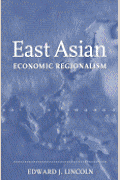

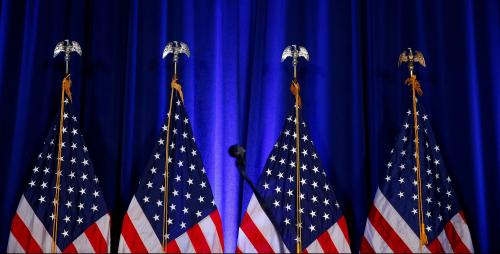

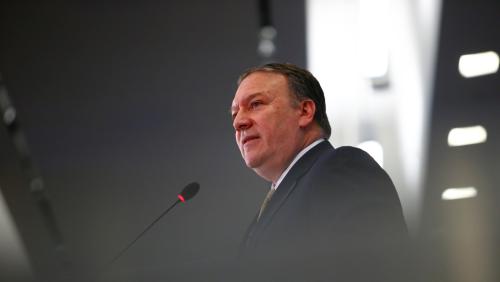






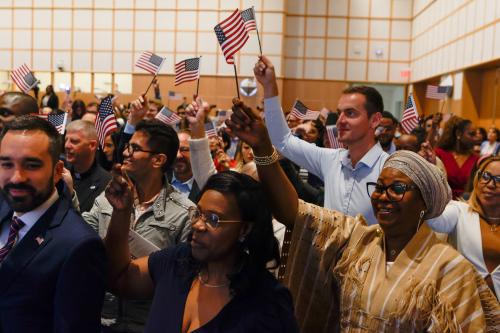
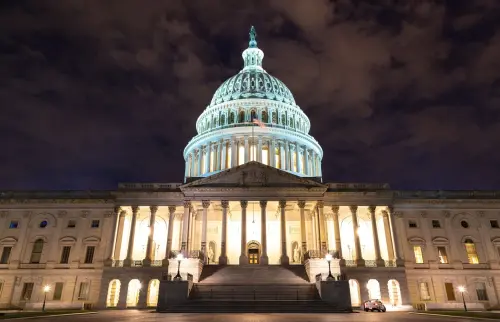
Commentary
Trump’s speech to Congress: Reactions from foreign policy experts
March 1, 2017